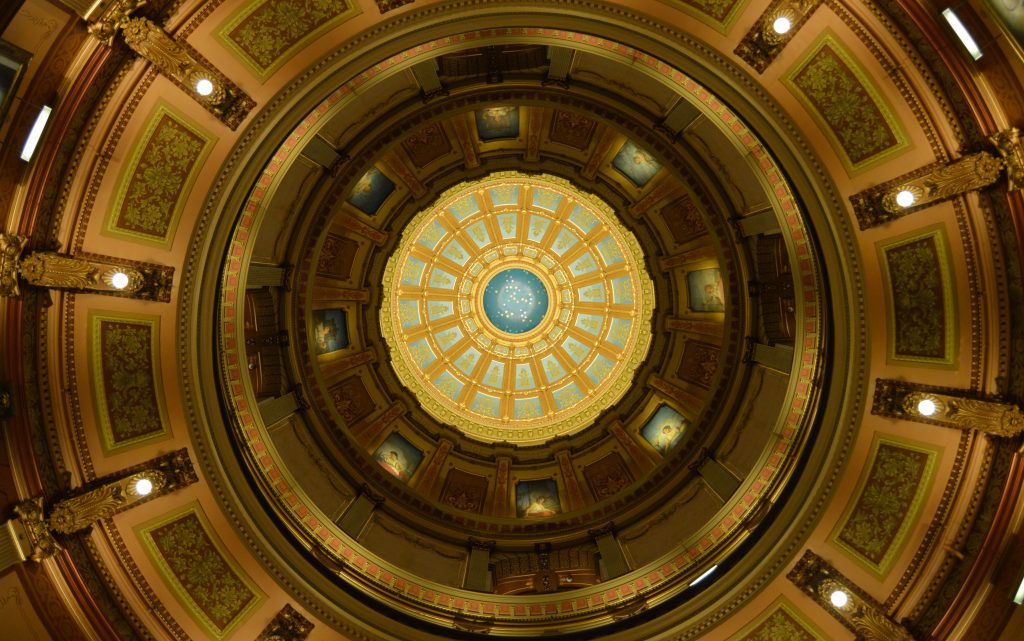Capitol Safety Problems Put Critical Bills, Transparency in Jeopardy
The Legislature is trying to pass important bills in its last scheduled week this year. But COVID is making that difficult.

As the Legislature tries to pass important bills in its last scheduled week this year, a number of lawmakers, staffers, and journalists say they don’t feel safe working at the state Capitol in 2020. The sentiment also comes as legislative buildings are closed due to “credible threats of violence” as Michigan’s electors get set to cast their votes for president.
“It’s a disservice for sure to journalists, and also the people of Michigan, who were really asking questions on behalf of those people.” – Abigail Censky, WKAR Public Radio.
MichMash hosts Jake Neher and Cheyna Roth talk with WKAR Capitol reporter Abigail Censky about why all Michiganders should be concerned about safety at the Capitol.
Subscribe to MichMash on iTunes, Spotify, Google Podcasts, NPR One or wherever you get your podcasts.
This is the final week of the state legislature’s “Lame Duck” session. That means after this week, all active legislation that hasn’t passed dies and there won’t be any more bills passed until next year. But unlike in years past, this session has been fraught with delays and setbacks due to COVID-19.
Session days and committee hearings were canceled last week in the state House due to reports of a staff member contracting coronavirus. This wasn’t the first time this year that session has been disrupted because of COVID-19.
At least 11 members of the Legislature have been diagnosed with COVID-19 since March. Staff in the House and Senate business offices are subject to CDC guidelines on contact tracing, mask-wearing and social distancing, but mask-wearing by lawmakers and members of the public attending state government functions has not been mandated or enforced.
Read more: Michigan legislature still doesn’t have a plan to fight COVID-19 as surge continues
“The Capitol is kind of a cluster of coronavirus cases,” says Censky.
“Right now… the House is being investigated by the Michigan Occupational Safety and Health Administration (MIOSHA) after receiving a complaint from an employee for potentially violating COVID-19 workplace rules. And that’s basically because they’ve been holding these hearings where it’s not really enforced if people coming to the hearings are wearing masks or social distancing or wearing them properly.”
But coronavirus isn’t the only recent danger at the Capitol. Armed protestors were at the Capitol on April 30, objecting to Gov. Gretchen Whitmer’s stay home orders aimed at curbing the spread of COVID-19. Some of those present were later charged with being part of a plot to kidnap Whitmer.
“As far as covering the Capitol, it’s dangerous, frankly, for COVID exposure.” – Abigail Censky, WKAR Public Radio.
These threats, particularly the spread of coronavirus, have led reporters like Censky to rethink how they cover the Capitol.
“So, as far as covering the Capitol, it’s dangerous, frankly, for COVID exposure,” she says. “A lot of journalists and other interested parties are choosing to watch the live stream and cover things remotely because it is dangerous.”
This is a problem for journalists trying to cover what lawmakers are doing and voting on, says Censky. If they can’t talk to lawmakers in person after committee hearings or during session, it’s easy for lawmakers to dodge reporters with tough questions.
“I think you have to get creative on your sourcing,” Censky says. “But it’s a disservice to journalists, and also the people of Michigan, who were really asking questions on behalf of those people.”
More From MichMash:
‘Five hours of delusion.’ Former Michigan GOP lawmaker reacts to Giuliani hearing
Michigan legislature still doesn’t have a plan to fight COVID-19 as surge continues
What two Michigan counties say about the entire state’s evolving political identity
Trusted, accurate, up-to-date
WDET is here to keep you informed on essential information, news and resources related to COVID-19.
This is a stressful, insecure time for many. So it’s more important than ever for you, our listeners and readers, who are able to donate to keep supporting WDET’s mission. Please make a gift today.
